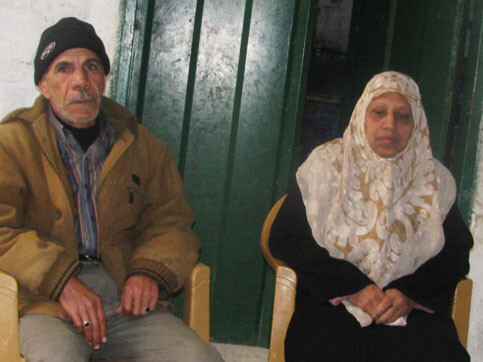Gaza Strip 4 March 2010

Rami Abu al-Sheikh’s parents outside their home in the Maghazi refugee camp in Gaza.
Rami Abu al-Sheikh’s parents and siblings still remember how caring and tender their son was before he was killed during Israel’s invasion of Gaza last winter. Rami was 27 years old and was one of hundreds of Gaza police personnel killed by Israeli air strikes during the 23-day assault. He was killed at the main Gaza Strip police station located on Salah al-din Street, the territory’s main road.
“He headed for his work in the morning of Saturday, 27 December 2009. At 11:20am, we heard sporadic explosions around. We got concerned about him, so I began calling his cellular but it was turned off. Right after the shelling stopped, I rushed to the police where my son was present, yet I was not able to make sure if he was alive,” recalled his father, Suleiman Abu al-Sheikh.
Rami was the eldest son and had the closest relationship to his father. Sitting in the bedroom where Rami used to live with his wife and four-month-old baby, Suleiman explained that his son “used to have a high sense of responsibility toward me, his mother, two brothers and sister.”
Recounting the story of his son’s death, Suleiman recalled that after they heard about the shelling of different police posts around Gaza, he started to search for his son at the hospital. “At the morgue of the al-Aqsa Martyrs Hospital in the central Gaza Strip, I began looking at the dead bodies of many other police members. I recognized my the pants that my son was wearing that awful day [on one of the bodies]. His face was totally distorted.”
Rami’s mother was initially reluctant to speak about the day her son was killed. Umm Rami explained that “On that sad day, Rami accompanied me to a weaving shop, where I used to do some work. About a couple of hours later, as the bombings grew louder, I felt like my heart would pop out and I became very concerned about my son. Later on in the evening, I realized he was killed.”
She added, “All I can say is that I do hope that peace prevails and that all mothers here and even in Israel won’t lose their loved ones.”
Abu Jamil Motawe, a neighbor of the Abu al-Sheikh family in the Maghazi refugee camp, recalled of the martyred policeman, “Rami was a good young man. He was quiet and focused on his work in order to help his family. The neighborhood lost a nice man.”
The Abu Midan police station where Rami used to work is now empty and not a single brick is left standing after the Israeli air strike. Only two policemen were present at midday at what used to be the station’s front door. Their duties are limited to organizing traffic along the Salah al-Din road.
Israel’s invasion of Gaza left hundreds of police outposts in the Hamas-ruled Gaza Strip either partially or completely devastated. According to police officials here, the Israeli attacks claimed the lives of at least 400 police members, including junior and senior staff.
Since the war came to an end, the Hamas authorities have been attempting to rehabilitate the damage, yet Gaza has been lacking raw building materials or a strong economy, due to the Israeli blockade that has been in place for more than two and a half years.
Ehab al-Ghosain, spokesperson for Hamas’s interior ministry, explained the major obstacles in rebuilding a police force over the past 15 months. “Despite the destruction of many police posts during the war, the Palestinian police managed to stay on duty using makeshift offices in other areas or even building some posts out of clay — like the one in the northern Gaza Strip town of Beit Lahiya.” He added that rubble from all the destroyed police buildings has been removed.
Like the rest of Gaza, the Abu al-Sheikh family has slowly started to rebuild their own lives — but the scars remain. “Last week, Rami’s sister was engaged and I had a double feeling,” Suleiman said, “a feeling of happiness for my daughter and another of sadness because we missed Rami, my eldest son.”
According to Gaza’s traditions, some families marry their son’s widow to one of their other sons. Rami’s widow, Haya, is now married to his brother Mahmoud. “The first word that Rami’s daughter uttered was ‘came,’ as if she was waiting for her dad to return, but unfortunately Rami won’t come back.”
All images by Rami Almeghari.
Rami Almeghari is a journalist and university lecturer based in the Gaza Strip.





